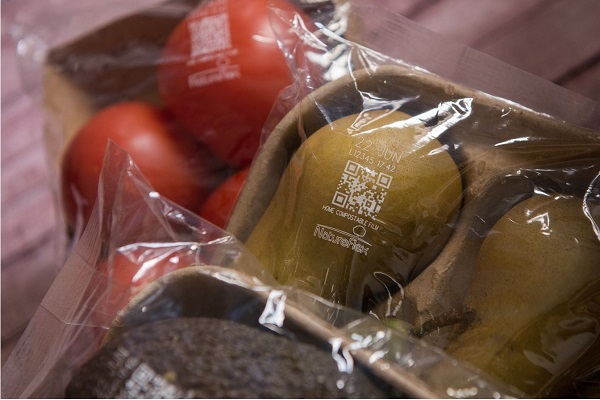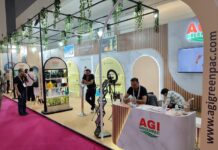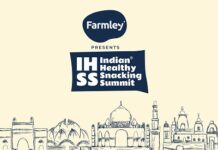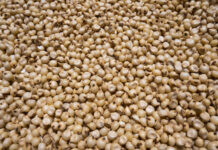
Domino Printing Sciences (Domino) is pleased to reveal its D-Series CO2 laser coders as an additive-free solution for food manufacturers utilizing NatureFlex compostable cellulose films.
Domino has collaborated with global packaging film producer, Futamura, to assess the suitability of laser coding for NatureFlex compostable film products. Following initial suitability testing, Domino’s D-Series CO2 laser was used to code the NatureFlex compostable film and achieved a clean, crisp, white code. There was no impact on film integrity or chemical composition, and moisture barrier properties were unaffected.
“We are very pleased to be able to offer Futamura’s food packaging customers an additive-free laser coding solution for their product packaging,” says Dr Stefan Stadler, team lead at the Domino Laser Academy. “We predict that requests for compostable solutions will become more prominent in the coming years, and we are ready and willing to work with any brand exploring these new materials to help find the right coding solution for their requirements.”
Coding requirements of compostable films
NatureFlex films have been developed for use in food packaging applications to meet the growing demand for environmentally responsible packaging. The films are designed to meet all the global standards for industrial composting, including BS EN13432, and are certified as home compostable under the OK Compost Home standard.
“Brand owners are always looking at ways to communicate with their consumers on their packaging,” says Amaia Cowan, business development manager – EMEA, Futamura UK. “All of our NatureFlex films are certified to prove their suitability for industrial and home composting. Many of our customers want to show the final packaging’s certification and additional disposal information on the film to help inform end consumers.”
The option of laser coding a message onto the NatureFlex flexible film is attractive as the coding method does not require adding any additional materials onto the compostable substrate, which could complicate final certification.
Developing the solution
Domino’s coding experts analyzed six different variants of NatureFlex compostable film to determine which laser coding solution would be the most appropriate option for further suitability testing. This included undertaking spectroscopic analysis for the substrates to determine which wavelength of light has the best interaction with the substrate material, followed by coding the samples using one of Domino’s D120i CO2 laser coders.
On all six NatureFlex variants, the D120i produced a clear, crisp, white code. Even under very high printing speeds, the codes were clear and legible, making the D-Series lasers a highly feasible solution for compostable coding films in food packaging applications.
After coding the films, Domino’s laser experts used microscopic imaging and spectroscopy techniques to confirm that no structural damage was inflicted and that the solution did not cause any chemical changes that could affect the substrate’s performance as a food packaging material.
The result is positive
“We were reassured by Domino’s scientific approach to substrate testing and coding and willingness to provide us with the results and assurance that we needed to confirm that laser coders are a suitable solution for our compostable films,” says Cowan.
The quality and clarity of the codes make laser coding on NatureFlex flexible film a good choice for food manufacturers looking to create both simple codes, such as best before dates and batch codes, as well as more complex designs and messaging, including graphics and scannable 2D codes.
“The results from the project are very positive,” says Cowan. “This new coding method will enable the inclusion of a message to consumers on the film itself, without printing. As no additional materials are added to the compostable films, seeking certification of the final packaging will be straightforward.”
Domino’s approach toward sustainability
The Futamura and NatureFlex compostable film project is an exciting development in laser coding for sustainable substrates. It is just one example of how Domino is working to support customers on their sustainability journey.
“We want to remain at the forefront of developments in new and emerging packaging materials to ensure that we can continue to meet the needs of our customers in all industries,” says Dr Stefan Stadler, Team Lead at the Domino Laser Academy in Hamburg. “We have a vision for our Laser Academy as a substrate centre of excellence where we can invest in scientific testing and coding of new materials, based on our exploratory research, as well as direct customer requests.
“By taking a scientific approach to laser coding, we can significantly accelerate the process of consistently and reliably creating an attractive, high-contrast code, and ensure product safety and barrier properties are maintained – which is fundamental to our customers.”
IndiFoodBev — authentic, impactful and influential
An English-language food and beverage processing and packaging industry B2B platform in print and web, IndiFoodBev is in its third year of publication. It is said that the Indian food and beverage industries represent approximately US$ 900 billion in revenues which implies more than 20% of the country’s GDP. Eliminating the wastage on the farmside can help to deliver more protein to a higher number of the population apart from generating sizable exports. The savings in soil, seeds, water, fertilizer, energy and ultimately food and nutrition could be the most immense contribution that country is poised to make to the moderation of climate change.
To improve your marketing and grow sales to the food and beverage processing and packaging industry, talk to us. Our research and consulting company IppStar [www.ippstar.org] can assess your potential and addressable markets in light of the competition. We can discuss marketing, communication, and sales strategies for market entry and growth.
Suppliers and service providers with a strategy and budget for targeted marketing can discuss using our hybrid print, web, video, and social media channels to create brand recognition linked to market relevance. Our technical writers are ready to meet you and your customers for content.
The second largest producer of fruit and vegetables in the world is continuously expanding processing capacities and delivery systems with appropriate innovative technologies. We cover product and consumer trends, nutrition, processing, research, equipment and packaging from farm to thali. Get our 2025 media kit and recalibrate your role in this dynamic market. Enhance your visibility and relevance to existing markets and turn potential customers into conversations. Ask for a sample copy of our bi-monthly in print or our weekly IndiFoodBev eZine each Wednesday.
For editorial info@ippgroup.in — for advertisement ads1@ippgroup.in and for subscriptions subscription@ippgroup.in
Naresh Khanna – 10 February 2025
Subscribe Now










